There has been much speculation about the threat posed by Wagner as the group is based in Belarus, which shares borders with Ukraine and NATO members Poland and Lithuania.
US Ambassador to the United Nations Linda Thomas-Greenfield warned on July 31 that any attack by the Wagner Group on NATO would be seen as a Russian attack on the military alliance.
Ms Thomas-Greenfield made the statement while speaking to reporters in New York on a range of issues, including ending hunger, combating food insecurity in conflicts and protecting human rights.
Asked about the presence of Wagner troops near the Polish border and whether she considered it a real threat to NATO, the US ambassador said: “We are certainly concerned that this group, acting at the behest of the Russian government, is a threat to all of us.”
The US official stressed the clear message: “Any attack by Wagner on NATO will be viewed as an attack by the Russian government on this military alliance.”
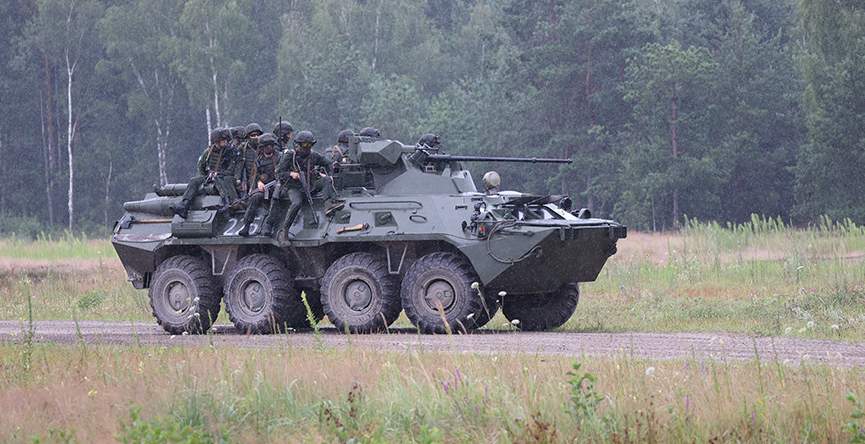
Belarusian armed forces train with Wagner fighters at the Brestsky training ground, near the Polish border, July 2023. Photo: BelTA
Anxiety
Wagner's redeployment in Belarus after a failed coup in late June is being closely monitored by Ukraine, Poland, Lithuania and Western allies.
“Several thousand Wagner troops and approximately 300 tents and 200 vehicles have been detected in satellite imagery of their new camp in Tsel, Belarus, approximately 85 km southeast of the Belarusian capital Minsk and 230 km from the Ukrainian border,” the latest intelligence update from the UK Ministry of Defence on July 30 said.
Poland – a country that shares a border with Belarus and has deployed more than 1,000 troops to its eastern border as a precaution – is nervous about every move by the Russian mercenaries.
“We have information that more than 100 Wagner soldiers have advanced towards the Suwalki Corridor, not far from Grodno in Belarus,” Polish Prime Minister Mateusz Morawiecki said at a press conference on July 29.
Grodno is a city in western Belarus, about 15 km from the border with NATO members Poland and Lithuania. The Suwalki Corridor is a narrow strategic land corridor running along the Polish-Lithuanian border, connecting Belarus with the Russian exclave of Kaliningrad on the Baltic Sea.
This 65-km strip of land is of immense strategic significance because if Russia and Belarus were able to capture it, the Baltic region – which includes Lithuania, Latvia and Estonia – would be isolated, jeopardizing NATO's ability to defend the region.
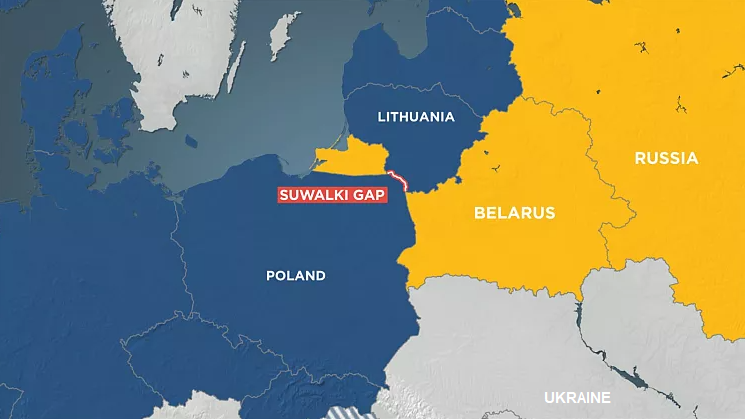
Map showing the Suwalki Gap - a 65km-long narrow strip of land running along the Polish-Lithuanian border that is strategically important. Graphic: Euronews
In addition, the Polish-Belarusian border has been a tense place for several years now, after a large number of refugees and migrants from the Middle East and Africa began to arrive, seeking to enter the EU by passing through Poland, as well as Lithuania.
The Polish government has accused Russia and Belarus of using migrants to destabilize Poland and other EU countries. Warsaw has called the exploitation of the migration issue a form of hybrid warfare, and has responded by building a high wall along part of Poland's border with Belarus.
Polish Prime Minister Morawiecki noted that 16,000 border crossing attempts by migrants from Belarus have been recorded this year. Belarusian President Alexander Lukashenko and Russian President Vladimir Putin want to “push them to Poland,” Morawiecki said.
“The situation is becoming increasingly dangerous… It is very possible that they (Wagner soldiers) will disguise themselves as Belarusian border guards and help illegal migrants reach Polish territory, and destabilize Poland.”
In Lithuania, the country's deputy interior minister warned on July 28 about the possibility of the Baltic state closing its border with Belarus, also amid concerns that Wagner could disguise himself as asylum seekers trying to cross the common border between Belarus and EU member states or carry out provocations involving refugees.
Psychological blow
Belarusian President Alexander Lukashenko, in his first face-to-face meeting with Russian President Vladimir Putin since the coup, said Wagner soldiers were “stressing him out” by calling for “a march” into Poland.
“But of course, I will keep them in Belarus, as we agreed,” Mr. Lukashenko said.
The British Ministry of Defense, in an intelligence update on July 30, supported the idea that this was purely a psychological “blow” rather than any real threat.
Although “hundreds of vehicles have arrived at the previously largely empty base,” most are “trucks and minibuses along with a few armored fighting vehicles,” the update said.
“It is still unclear what happened to the heavy equipment Wagner used in Ukraine; there is a real possibility that they were forced to return it to the Russian military.”
In an article on July 31, the Kyiv Post quoted the Main Intelligence Directorate (GUR) of the Ukrainian Defense Ministry as saying that Wagner gunmen could be “used for special informational and psychological operations,” such as keeping Poland on alert and spreading fear and anxiety.
Mykhailo Podolyak, Advisor to the Office of the President of Ukraine, also said that the idea of a Wagner attack on a NATO country is very unpromising, the Kyiv Post reported.
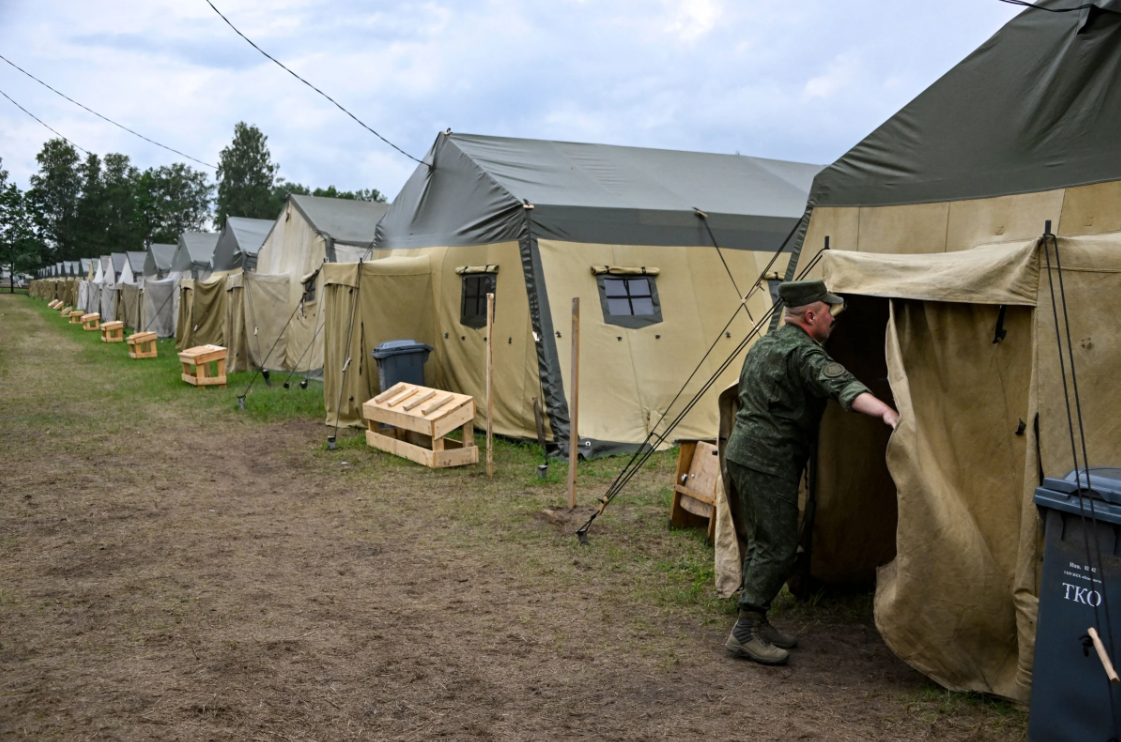
Tents at the Tsel military base in Osipovichi, a town 230 km north of the Belarus-Ukraine border, which could be used as a field camp for Wagner soldiers, July 7, 2023. Photo: Getty Images
According to the Ukrainian newspaper, in an interview with a Russian opposition journalist, Yulia Latynina, Mr. Podolyak dismissed the threats from Wagner soldiers against Poland, calling them “not funny jokes.”
Mr. Podolyak asserted that such an attack was not feasible because the Wagner group had not been the same since the armed rebellion.
Furthermore, if Wagner did attack Poland, it would spark a major international incident. In theory, it would trigger Article 5 – the most famous clause in the NATO Charter on collective defense, where an attack against one ally is considered an attack against all.
“Russia has always wanted to show that NATO is just a paper tiger,” Dr. Stephen Hall, a lecturer in Russian Politics at the University of Bath (UK), told Euronews.
If the US-led military alliance fails to come to the aid of its allies in the event of attack – as it is obliged to do – NATO would be “completely destroyed”, Mr Hall said.
Mr Hall said it was also possible that Poland and its nearby allies were amplifying the threat posed by Wagner to gain more support from the EU and NATO.
“Warsaw and Vilnius are naturally worried that Russia, Belarus or Wagner could cause trouble. Right now, I think it is something to be wary of. Anything can happen,” the expert concluded .
Minh Duc (According to Anadolu Agency, Kyiv Post, Euronews, Al Jazeera)
Source












![[Photo] General Secretary To Lam meets with Chairman of the Federation Council, Parliament of the Russian Federation](https://vphoto.vietnam.vn/thumb/1200x675/vietnam/resource/IMAGE/2025/5/10/2c37f1980bdc48c4a04ca24b5f544b33)
![[Photo] Ho Chi Minh City: Many people release flower lanterns to celebrate Buddha's Birthday](https://vphoto.vietnam.vn/thumb/1200x675/vietnam/resource/IMAGE/2025/5/10/5d57dc648c0f46ffa3b22a3e6e3eac3e)































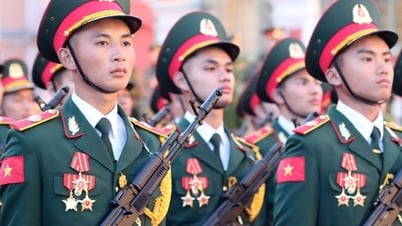





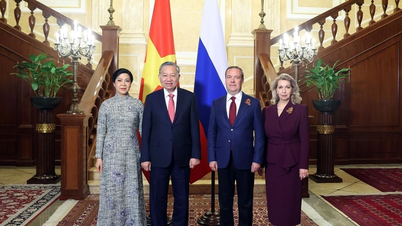































Comment (0)